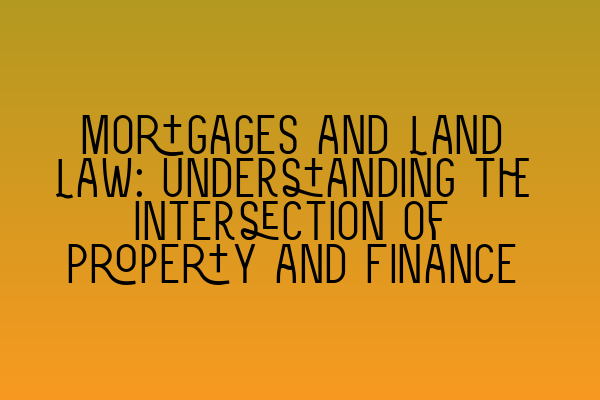Mortgages and Land Law: Understanding the Intersection of Property and Finance
In the world of property law, mortgages play a significant role in financing real estate transactions. Mortgages allow individuals and businesses to obtain the necessary funds to purchase a property, while land law governs the rights and obligations associated with land ownership. The interaction between mortgages and land law is essential to comprehend when navigating property transactions, as it affects both buyers and lenders. In this article, we will explore the intersection of mortgages and land law, highlighting key concepts and providing insights into their practical implications.
Before delving into the intricacies of mortgages and land law, let’s first define these terms. A mortgage is a legal agreement between a borrower (mortgagor) and a lender (mortgagee) that allows the borrower to access funds for purchasing a property. The borrower pledges the property as collateral, providing security for the repayment of the loan. Land law, on the other hand, refers to the legal framework governing the ownership, transfer, and use of land.
Understanding the legal framework surrounding mortgages is crucial for both buyers and lenders. For buyers, it is essential to assess the terms and conditions of the mortgage agreement, including interest rates, repayment schedules, and any additional fees. This evaluation ensures that buyers are aware of their financial obligations and can plan their budget accordingly. Lenders, too, must have a firm grasp of land law to protect their interests. They rely on various legal mechanisms, such as charging orders and rights of redemption, to secure their position in case of default.
One vital aspect of mortgages and land law is the concept of security. The property pledged as collateral acts as security to protect the lender’s interest in the event of default. This means that if the borrower fails to repay the loan, the lender has the right to take possession of the property and sell it to recover the outstanding debt. This process, known as foreclosure, is a powerful tool for lenders to enforce their rights and recoup their investment.
To give thorough consideration to mortgages and land law, several key elements come into play. These include legal formalities, registration requirements, and the priority of interests. Legal formalities refer to the necessary steps and documentation required to create a legally binding mortgage. These formalities often vary between jurisdictions, so it is vital to consult with a qualified solicitor or legal professional to ensure compliance.
Registering a mortgage is another crucial step in the process, as it grants visibility and priority to the lender’s interest. Registration serves as notice to other potential purchasers or creditors that the property is already encumbered. It helps avoid disputes over ownership and provides transparency in property transactions. Understanding the registration requirements in your jurisdiction is essential to protect your legal rights as a lender or borrower.
When multiple interests exist in a property, establishing the priority of these interests becomes paramount. Priority determines who has the right to be repaid first in the event of a sale or foreclosure. Generally, the first mortgagee holds the highest priority, followed by subsequent mortgagees or other secured creditors. Understanding the concept of priority is crucial for lenders when evaluating the financial viability and risk associated with a mortgage transaction.
As an SEO expert, I understand the importance of incorporating keywords relevant to mortgages and land law. Proper keyword integration allows search engines to recognize the relevance of the content and rank it higher in search results. For individuals preparing for the SQE exams, related articles and resources are available. The SQE practice exam questions and practice mocks will help you prepare effectively for the examination. Furthermore, SQE 1 and SQE 2 preparation courses are available to sharpen your knowledge and skills. Knowing the SQE exam dates is also beneficial for planning your study schedule.
In conclusion, the interaction between mortgages and land law is a fundamental aspect of real estate transactions. Understanding the legal framework surrounding mortgages, including security, legal formalities, registration requirements, and priority of interests, is essential for both buyers and lenders. By grasping these concepts and seeking professional advice when necessary, individuals can navigate property transactions with confidence. Whether you are a buyer seeking to finance your property or a lender looking to protect your investment, the understanding of mortgages and land law is crucial for a successful transaction.
